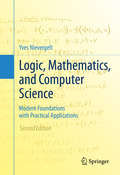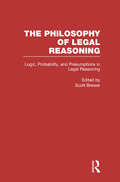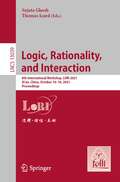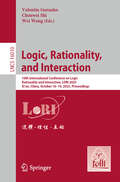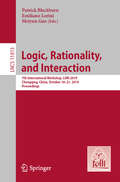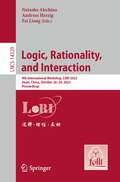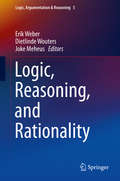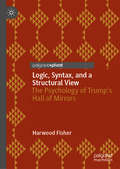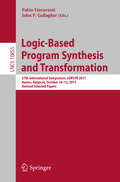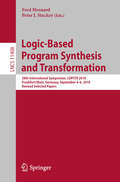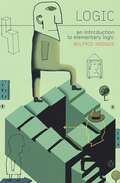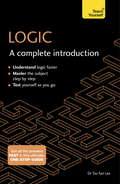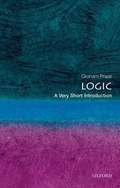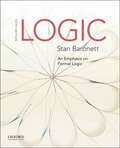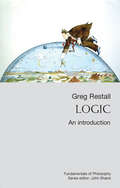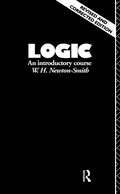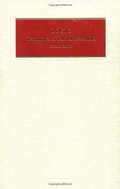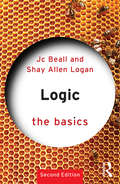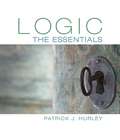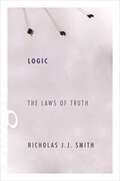- Table View
- List View
Logic, Mathematics, and Computer Science
by Yves NievergeltThis text for the first or second year undergraduate in mathematics, logic, computer science, or social sciences, introduces the reader to logic, proofs, sets, and number theory. It also serves as an excellent independent study reference and resource for instructors. Adapted from Foundations of Logic and Mathematics: Applications to Science and Cryptography © 2002 BirkhÓ"user, this second edition provides a modern introduction to the foundations of logic, mathematics, and computers science, developing the theory that demonstrates construction of all mathematics and theoretical computer science from logic and set theory. The focuses is on foundations, with specific statements of all the associated axioms and rules of logic and set theory, and provides complete details and derivations of formal proofs. Copious references to literature that document historical development is also provided. Answers are found to many questions that usually remain unanswered: Why is the truth table for logical implication so unintuitive? Why are there no recipes to design proofs? Where do these numerous mathematical rules come from? What issues in logic, mathematics, and computer science still remain unresolved? And the perennial question: In what ways are we going to use this material? Additionally, the selection of topics presented reflects many major accomplishments from the twentieth century and includes applications in game theory and Nash's equilibrium, Gale and Shapley's match making algorithms, Arrow's Impossibility Theorem in voting, to name a few. From the reviews of the first edition: ". . . All the results are proved in full detail from first principles. . . remarkably, the arithmetic laws on the rational numbers are proved, step after step, starting from the very definitions!. . . This is a valuable reference text and a useful companion for anybody wondering how basic mathematical concepts can be rigorously developed within set theory. " --MATHEMATICAL REVIEWS "Rigorous and modern in its theoretical aspect, attractive as a detective novel in its applied aspects, this paper book deserves the attention of both beginners and advanced students in mathematics, logic and computer sciences as well as in social sciences. " --Zentralblatt MATH
Logic, Probability, and Presumptions in Legal Reasoning: A Collection Of Essays By Philosophers And Legal Scholars: Logic, Probability, And Presumptions In Legal Reasoning (Philosophy of Legal Reasoning: A Collection of Essays by Philosophers and Legal Scholars #No. 1)
by Scott BrewerAt least since plato and Aristotle, thinkers have pondered the relationship between philosophical arguments and the "sophistical" arguments offered by the Sophists -- who were the first professional lawyers. Judges wield substantial political power, and the justifications they offer for their decisions are a vital means by which citizens can assess the legitimacy of how that power is exercised. However, to evaluate judicial justifications requires close attention to the method of reasoning behind decisions. This new collection illuminates and explains the political and moral importance in justifying the exercise of judicial power.
Logic, Rationality, and Interaction: 8th International Workshop, LORI 2021, Xi'ian, China, October 16-18, 2021, Proceedings (Lecture Notes in Computer Science #13039)
by Sujata Ghosh Thomas IcardThis LNCS book is part of the FOLLI book series and constitutes the proceedings of the 8th International Workshop on Logic, Rationality, and Interaction, LORI 2021, held in Xi`an, China, in October 2021.The 15 full papers presented together with 7 short papers in this book were carefully reviewed and selected from 40 submissions. The workshop covers a wide range on the following topics such as doxastic and epistemic logics, deontic logic, intuitionistic and subsstructural logics, voting theory, and (a new theme emphasized this year) causal inference.
Logic, Rationality, and Interaction: 10th International Conference on Logic, Rationality and Interaction, LORI 2025, Xi’an, China, October 16–19, 2025, Proceedings (Lecture Notes in Computer Science #16010)
by Wei Wang Valentin Goranko Chenwei ShiThis LNCS book is part of the FOLLI book series and constitutes the proceedings of the 10th International Conference on Logic, Rationality, and Interaction, LORI 2025, held in Xi&’an, China, in October 2025. The 14 full papers presented in this book were carefully reviewed and selected from 47 submissions.The topics addressed in this program effectively showcase the breadth and depth characteristic of the LORI conference series, including contributions on dynamic epistemic logic, nonmonotonic reasoning, belief revision theory, decision theory, causal inference, social epistemology and so on.
Logic, Rationality, and Interaction: 7th International Workshop, LORI 2019, Chongqing, China, October 18–21, 2019, Proceedings (Lecture Notes in Computer Science #11813)
by Patrick Blackburn Emiliano Lorini Meiyun GuoThis LNCS book is part of the FOLLI book series and constitutes the proceedings of the 7th International Workshop on Logic, Rationality, and Interaction, LORI 2019, held in Chongqing, China, in October 2019.The 31 papers presented in this book were carefully reviewed and selected from 56 submissions. They focus on the following topics: agency; argumentation and agreement; belief revision and belief merging; belief representation; cooperation; decision making and planning; natural language; philosophy and philosophical logic; and strategic reasoning.
Logic, Rationality, and Interaction: 9th International Workshop, LORI 2023, Jinan, China, October 26–29, 2023, Proceedings (Lecture Notes in Computer Science #14329)
by Andreas Herzig Natasha Alechina Fei LiangThis LNCS book is part of the FOLLI book series and constitutes the proceedings of the 9th International Workshop on Logic, Rationality, and Interaction, LORI 2023, held in Jinan, China, in October 2023.The 15 full papers presented together with 7 short papers in this book were carefully reviewed and selected from 40 submissions. The workshop covers a wide range on the following topics such as agency; argumentation and agreement; belief representation; probability and uncertainty; belief revision and belief merging; knowledge and action; dynamics of informational attitudes; intentions, plans, and goals; decision making and planning; preference and utility; cooperation; strategic reasoning and game theory; epistemology; social choice; social interaction; speech acts; knowledge representation; norms and normative systems; natural language; rationality; philosophical logic.
Logic, Reasoning, and Rationality
by Erik Weber Dietlinde Wouters Joke MeheusThis book contains a selection of the papers presented at the Logic, Reasoning and Rationality 2010 conference (LRR10) in Ghent. The conference aimed at stimulating the use of formal frameworks to explicate concrete cases of human reasoning, and conversely, to challenge scholars in formal studies by presenting them with interesting new cases of actual reasoning. According to the members of the Wiener Kreis, there was a strong connection between logic, reasoning, and rationality and that human reasoning is rational in so far as it is based on (classical) logic. Later, this belief came under attack and logic was deemed inadequate to explicate actual cases of human reasoning. Today, there is a growing interest in reconnecting logic, reasoning and rationality. A central motor for this change was the development of non-classical logics and non-classical formal frameworks. The book contains contributions in various non-classical formal frameworks, case studies that enhance our apprehension of concrete reasoning patterns, and studies of the philosophical implications for our understanding of the notions of rationality.
Logic, Syntax, and a Structural View: The Psychology of Trump's Hall of Mirrors
by Harwood FisherThis book presents a new structural approach to the psychology of the person, inspired by Kenneth Colby’s computer-generated simulation, PARRY. The simulation was of a paranoid psychological state, represented in forms of the person's logic and syntax, as these would be evidenced in personal communication. Harwood Fisher uses a Structural View to highlight similarities in the logical form of the linguistic representations of Donald Trump, his avid followers (“Trumpers”), and the paranoid—referred to as “The Trio.” He demonstrates how the Structural View forms a series of logical and schematic patterns, similar to the way that content analysis can bring forth associations meanings, and concepts held in the text. Such comparisons, Fisher argues, can be used to shed light on contingencies for presenting, representing, and judging truth. Specifically, Fisher posits that the major syntactic and logical patterns that were used to produce the computer-generated “paranoid” responses in Colby’s project can be used to analyze Donald Trump’s rhetoric and his followers’ reactions to it. Ultimately, Fisher offers a new kind of structural approach for the philosophy of psychology. This novel work will appeal to students and scholars of social and cognitive psychology, psychology of personality, psychiatric classification, psycholinguistics, rhetoric, and computer science.
Logic-Based Program Synthesis and Transformation: 27th International Symposium, LOPSTR 2017, Namur, Belgium, October 10-12, 2017, Revised Selected Papers (Lecture Notes in Computer Science #10855)
by John P. Gallagher Fabio FioravantiThis book constitutes the thoroughly refereed post-conference proceedings of the 27th International Symposium on Logic-Based Program Synthesis and Transformation, LOPSTR 2017, held in Namur, Belgium, in October 2017. The 19 revised full papers were carefully reviewed and selected from 29 submissions. In addition to the 19 revised papers, this volume includes the abstracts of the invited talks by three outstanding speakers: Sumit Gulwani, Marieke Huisman, and Grigore Roşu. The aim of the LOPSTR series is to stimulate and promote international research and collaboration on logic-based program development. LOPSTR is open to contributions in all aspects of logic-based program development, all stages of the software life cycle, and issues of both programming-in-the-small and programming-in-the-large. LOPSTR traditionally solicits contributions, in any language paradigm, in the areas of synthesis, specification, transformation, analysis and verification, specialization, testing and certification, composition, program/model manipulation, optimization, transformational techniques in SE, inversion, applications, and tools.
Logic-Based Program Synthesis and Transformation: 28th International Symposium, LOPSTR 2018, Frankfurt/Main, Germany, September 4-6, 2018, Revised Selected Papers (Lecture Notes in Computer Science #11408)
by Fred Mesnard Peter J. StuckeyThis book constitutes the thoroughly refereed post-conference proceedings of the 28th International Symposium on Logic-Based Program Synthesis and Transformation, LOPSTR 2018, held in Frankfurt/Main, Germany, in September 2018.The 11 revised full papers were carefully reviewed and selected from 29 submissions. In addition to the 11 papers, this volume includes 3 abstracts of invited talks and 2 abstracts of invited tutorials. The papers are grouped into the following topics: analysis of term rewriting; logic-based distributed/concurrent programming; analysis of logic programming; and program analysis.
Logic-Based Program Synthesis and Transformation: 30th International Symposium, LOPSTR 2020, Bologna, Italy, September 7–9, 2020, Proceedings (Lecture Notes in Computer Science #12561)
by Maribel FernándezThis book constitutes the refereed proceedings of the 30th International Conference on Logic-Based Program Synthesis and Transformation, LOPSTR 2020, which was held during September 7-9, 2020. The 15 papers presented in this volume were carefully reviewed and selected from a total of 31 submissions. The book also contains two invited talks in full paper length. The contributions were organized in topical sections named: rewriting; unification; types; verification; model checking and probabilistic programming; program analysis and testing; and logics.
Logic: 15th International Workshop, Wollic 2008 Edinburgh, Uk, July 1-4, 2008, Proceedings (Lecture Notes In Computer Science Ser. #5110)
by Wilfrid HodgesIf a man supports Arsenal one day and Spurs the next then he is fickle but not necessarily illogical. From this starting point, and assuming no previous knowledge of logic, Wilfrid Hodges takes the reader through the whole gamut of logical expressions in a simple and lively way. Readers who are more mathematically adventurous will find optional sections introducing rather more challenging material. 'A lively and stimulating book' Philosophy
Logic: A Complete Introduction: Teach Yourself
by Siu-Fan LeeUnderstand Logic is a comprehensive introduction to this fascinating though sometimes challenging subject. As well as looking at logic in theoretical terms the book considers its everyday uses and demonstrates how it has genuine practical applications. It will take you step by step through the most difficult concepts and is packed with exercises to help you consolidate your learning at every stage. Covering everything from syllogistic logic to logical paradoxes and even looking at logic in Alice in Wonderland, this is the only guide you will ever need.
Logic: A Very Short Introduction
by Graham PriestThis book is an introduction to logic, as contemporary logicians now understand the subject. It does not attempt to be a textbook, however. The point of this one is to explore the roots of logic, which sink deep into philosophy. Some formal logic will be explained along the way. In each of the main chapters, I start by taking up some particular philosophical problem or logical puzzle. I then explain one approach to it.
Logic: An Emphasis on Formal Logic
by Stan BaronettFeaturing an exceptionally clear writing style and a wealth of real-world examples and exercises, Logic: An Emphasis on Formal Logic, Fifth Edition, shows how logic relates to everyday life, demonstrating its applications in such areas as the workplace, media and entertainment, politics, science and technology, student life, and elsewhere. The examples and exercises were chosen to be interesting, thought-provoking, and relevant to students.
Logic: An Introduction (Fundamentals of Philosophy)
by Greg RestallThe methods of logic are essential to an understanding of philosophy and are crucial in the study of mathematics, computing, linguistics and many other subjects. Introducing the major concepts and techniques involved in the study of logic, this authoritative book explores both formal and philosophical logic, and the ways in which we can achieve good reasoning. Individual chapters include: * Propositions and Arguments* Truth Tables* Trees* Conditionality* Natural Deduction* Predicates, Names and Quantifiers* Definite Descriptions. This exceptionally clear introduction to the subject is ideally suited to students taking introductory courses in logic.
Logic: An Introduction (Fundamentals of Philosophy)
by Greg RestallThe methods of logic are essential to an understanding of philosophy and are crucial in the study of mathematics, computing, linguistics and many other subjects. Introducing the major concepts and techniques involved in the study of logic, this authoritative book explores both formal and philosophical logic, and the ways in which we can achieve good reasoning. Individual chapters include: Propositions and Arguments Truth Tables Trees Conditionality Natural Deduction Predicates, Names and Quantifiers Definite Descriptions This exceptionally clear introduction to the subject is ideally suited to students taking introductory courses in logic.
Logic: An Introductory Course
by W.H. Newton-SmithFirst published in 1985. Routledge is an imprint of Taylor & Francis, an informa company.
Logic: Bullet Guides
by Joe MorrisonOpen this book and you will: - Learn what logic is - Use truth tables and truth trees - Make sense of complex arguments - Use logic every day
Logic: Bullet Guides
by Joe MorrisonOpen this book and you will Learn what logic is Use truth tables and truth trees Make sense of complex arguments Use logic every day
Logic: Teach Yourself
by Siu-Fan LeeUnderstand Logic is a comprehensive introduction to this fascinating though sometimes challenging subject. As well as looking at logic in theoretical terms the book considers its everyday uses and demonstrates how it has genuine practical applications. It will take you step by step through the most difficult concepts and is packed with exercises to help you consolidate your learning at every stage. Covering everything from syllogistic logic to logical paradoxes and even looking at logic in Alice in Wonderland, this is the only guide you will ever need.
Logic: Techniques Of Formal Reasoning
by Donald Kalish Gary Mar Richard MontagueLogic: Techniques of Formal Reasoning, 2/e is an introductory volume that teaches students to recognize and construct correct deductions. It takes students through all logical steps--from premise to conclusion--and presents appropriate symbols and terms, while giving examples to clarify principles. Logic, 2/e uses models to establish the invalidity of arguments, and includes exercise sets throughout, ranging from easy to challenging. Solutions are provided to selected exercises, and historical remarks discuss major contributions to the theories covered.
Logic: The Basics
by Jc Beall Shay A. LoganLogic: The Basics is an accessible introduction to several core areas of logic. The first part of the book features a self-contained introduction to the standard topics in classical logic, such as: · mathematical preliminaries · propositional logic · quantified logic (first monadic, then polyadic) · English and standard ‘symbolic translations’ · tableau procedures. Alongside comprehensive coverage of the standard topics, this thoroughly revised second edition also introduces several philosophically important nonclassical logics, free logics, and modal logics, and gives the reader an idea of how they can take their knowledge further. With its wealth of exercises (solutions available in the encyclopedic online supplement), Logic: The Basics is a useful textbook for courses ranging from the introductory level to the early graduate level, and also as a reference for students and researchers in philosophical logic.
Logic: The Essentials
by Patrick J. HurleyLOGIC: THE ESSENTIALS concentrates on the fundaments of introductory logic. Practical in orientation and content, Essentials is loaded with class-tested, proven practice exercises. This new text is based on the classic and bestselling textbook, A Concise Introduction to Logic, and nearly all of the exercises in the correlative chapters, so central to the effectiveness of that text, have been retained to ensure more than enough practice for students to master the central concepts. The book focuses largely on deductive logic, but it contains sufficient treatment of induction to provide a solid footing for informal fallacies. The result is a contemporary approach--more focused, more practical, less theoretical--built on a tradition of precise, elegant, and clear presentation of the subject matter of logic, both formal and informal.
Logic: The Laws of Truth
by Nicholas J.J. SmithLogic is essential to correct reasoning and also has important theoretical applications in philosophy, computer science, linguistics, and mathematics. This book provides an exceptionally clear introduction to classical logic, with a unique approach that emphasizes both the hows and whys of logic. Here Nicholas Smith thoroughly covers the formal tools and techniques of logic while also imparting a deeper understanding of their underlying rationales and broader philosophical significance. In addition, this is the only introduction to logic available today that presents all the major forms of proof--trees, natural deduction in all its major variants, axiomatic proofs, and sequent calculus. The book also features numerous exercises, with solutions available on an accompanying website.Logic is the ideal textbook for undergraduates and graduate students seeking a comprehensive and accessible introduction to the subject.Provides an essential introduction to classical logicEmphasizes the how and why of logicCovers both formal and philosophical issuesPresents all the major forms of proof--from trees to sequent calculusFeatures numerous exercises, with solutions available at http://njjsmith.com/philosophy/lawsoftruth/The ideal textbook for undergraduates and graduate students
